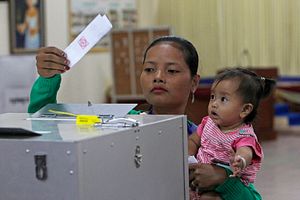PHNOM PENH – In the weeks building up to Cambodia’s last general election in 2013, Phnom Penh was alive with anticipation ahead of what was expected to be the toughest test Prime Minister Hun Sen had faced in a generation.
Supporters of the newly formed Cambodia National Rescue Party (CNRP) drove in the thousands through the capital, waving flags, blaring techno, and holding rallies. The atmosphere reached fever pitch a few days before the vote, as opposition leader Sam Rainsy was met by tens of thousands of supporters upon returning home from exile after a royal pardon removed the threat of a jail term.
The build up to the upcoming general election on July 29 will be a very different story.
A lot has changed in Cambodia over the past five years. The 2013 election was even closer than many observers predicted, with the CNRP coming within seven seats of victory. The opposition accused the ruling Cambodian People’s Party (CPP) of widespread vote rigging and embarked on protracted mass protests, culminating in the chant “Hun Sen, step down!” reverberating around Phnom Penh’s major boulevards toward the end of the year.
“People expressing themselves, from children to the elderly; it was an amazing moment for democracy and that’s the way democracy should be – letting people say what they have to say,” said Mu Sochua, a former CNRP deputy, from Stockholm.
“There was really a culture of peace, of freedom and I think those words would describe the protests in 2013.”
The demonstrations – which dovetailed with wider calls for labor and land rights – were brought to an abrupt and bloody end when security forces opened fire on protesters on January 3, 2014, killing at least five people.
Following a failed “culture of dialogue” between the two parties after the opposition eventually agreed to take its seats in parliament in mid-2014, Hun Sen tightened the screws further and further on the CNRP in the ensuing years.

































